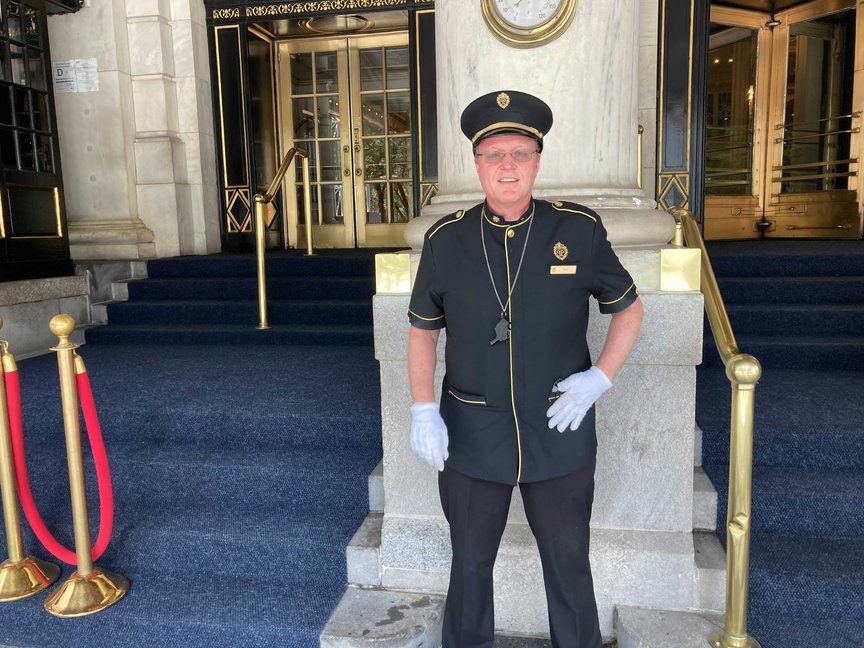Gothamist: Without More Tourists, City Hotels Can’t Bring Back All Their Furloughed Staffers
By: Beth Fertig
June 30, 2021
Emma Pickard, food and beverage manager at the Plaza Hotel in the Palm Court
Afternoon tea at the Plaza Hotel on Central Park South is an elegant affair. Guests sit under the stained glass dome of the Palm Court, with its crystal chandeliers and real live palm trees.
But the crowd is small. On a Monday afternoon, just about 30 people were seated in a room that can fit 300. Food and beverage manager Emma Pickard said guests can still have a Plaza experience, with “scones, sandwiches and pastries.” Some tables also have bags of cotton candy.
“That’s our very famous Eloise tea,” Pickard explains, referring to the Plaza’s famous fictional resident. “That’s served with pink lemonade cotton candy for the kids.”
Like most of the city’s hotels, the Plaza only reopened in the spring, once vaccines became widely available in the U.S. But New York, hotels rely heavily on international and business travel – both of which have yet to rebound. And experts say leisure travelers initially went to states like Florida that had fewer restrictions.
The domestic travel market is now finally coming back to New York and the city is spending $30 million on a new marketing campaign. But it’s going to be a while before tourism is back to pre-pandemic levels. In 2019, more than 66 million visitors generated $70 billion in economic activity.
So while hotels are reopening, they still don’t have enough guests to justify bringing back all their staffers. The Hotel Association of New York City said occupancy was about 66% percent in late June, down from almost 90% pre-pandemic.
At the Plaza, managing director George Cozonis said occupancy is about 30-50%, compared to 70% in June of 2019.
“We are not making money now, a profit,” he acknowledged. But with its international reputation, he said the Plaza isn’t just thinking about the short-term. “We felt it was important to be there for our guests. We think long term. The Plaza has been here for 114 years.”
But the hotel is cutting costs where it can during this early phase of reopening. About half of its 282 rooms are available until demand picks up. And because it’s still paying property taxes, insurance and other expenses, Cozonis said the Plaza hasn’t yet reopened other drinking and dining areas besides the Palm Court. As a result, he could only bring back 40% of its 750 staffers.
“There are a lot of fixed costs in a hotel,” he explained. “The fewer rooms you spread them over, the more expensive it becomes to operate the room.”
Saving money by eliminating food and beverage services
The Plaza may be a luxury brand with a big staff to guest ratio, but it’s facing the same dilemma as all other hotels in the city: How to capitalize on the summer reopening when business is limited? American Hotel and Lodging Association President Chip Rogers said they’re all cutting back on staff.
“You begin removing things that aren’t really central to someone staying at a hotel,” he explained. “And so it’s a lot of the food and beverage jobs that have not come back yet. The jobs that are back are those that are necessary, frankly, to run the hotel.”
That means the people who run the front desk, security, and cleaners.
“We don’t want to skimp on scheduling the right people to have the hotel, you know, looking spotless,” explained Sofia Vandaele, general manager at Intercontinental New York Partners, which runs the New York Barclay. The hotel reopened this month after a previous attempt last October, just as COVID-19 cases were rising again. Vandaele said meal services will resume this summer as more guests return in what she called a “tiered” reopening.
New York State’s Department of Labor estimates only 16,000 of the city’s hotel and motel workers were back at their jobs in May, or about 30% of the 52,000 pre-pandemic. Most are unionized, which cushioned the blow of extended furloughs.
Doorman Blake Engels at the Plaza Hotel BETH FERTIG / WNYC
Blake Engels and Neil Johnson, both longtime doormen now back at the Plaza, said their union benefits kept them from falling behind on bills.
“We were pretty, pretty well taken care of,” said Engels, who added that he enjoyed spending more time with his wife and three children while he was home.
“I had a collection of months for vacation,” said Johnson, who’s worked at the hotel for 23 years, twice as long as Engels. “So I was able to take it all in one chunk, along with severance pay. So it immediately went toward paying the rent and we were able to make it by.”
Doorman Neil Johnson outside of the Plaza Hotel
The New York Hotel and Motel Trades Council negotiated these “bridge payments” so its members could collect more than just unemployment. These are solid middle class jobs. The union said salaries range from $65,000 a year for housekeepers to more than $100,000 for those who get big tips like caterers.
Non union employees didn’t get the same deal. But the Plaza and some other hotels continued paying health insurance for managers. Pickard, the food and beverage manager, said she’s grateful. She had a hard time making rent on her one-bedroom apartment in Astoria with unemployment.
“It was day to day just worrying,” she said, wondering if she’d ever come back to her job. “And it was incredibly anxiety-inducing.”
Hotels, and workers, in waiting
While most of the city’s roughly 700 hotels reopened by the spring of 2021, the Hotel Association of New York City said at least 50 closed for good and more than 100 others have yet to reopen. Some are waiting until July while others are taking longer. They include airport hotels, Hilton and Marriott branded properties and small boutique hotels like Merrion Row.
The small hotel takes its name from a famous street in Dublin. It’s managed by Access Resorts, and director of operations Devesh Singh said he’s not sure when it can reopen.
“All I can say is maybe in September,” he explained. “We have September 1st tentatively. Maybe it goes to 15. Maybe it goes to October.”
Merrion Row is located in Times Square and relies heavily on Broadway, which isn’t coming back in force until the fall. It’s also an upscale hotel with only 28 rooms charging $300-$400 a night.
“Every hotel has a cost per occupied room depending on how much profit they want to make,” said Singh.
This is the challenge facing the city’s entire hotel industry, said Vijay Dandapani, president and CEO of the Hotel Association of New York City. By late June, he said, average room rates had risen to $194 per night, after plummeting last year. But the average revenue per room was only $128, compared to $257 for all of 2019.
“It’s a very high-cost operating business,” said Dandapani. The industry is calling on the city to extend its elimination of the nearly 6% hotel room occupancy tax beyond September, through the end of the year.
Hotels like the Plaza can afford to lose money in the short term in order to maintain their brands. Other luxury hotels like the Mandarin Oriental, the Pierre, and the Mark have reopened. But not the Four Seasons on West 57th St.
Last week, its hundreds of staffers learned the swanky hotel won’t reopen until next year. A letter from management, obtained by Gothamist/WNYC, said the hotel “will be undergoing substantial infrastructure and maintenance work that is expected to last well into 2022.” It also said it’s committed to recalling employees once business returns.
A few staffers spoke with Gothamist/WNYC but were afraid to be quoted because they want their jobs back when the hotel does reopen. Some said they’d fallen behind on housing payments and credit cards and don’t know how they’ll last until next year. “I’ve never in my life had a credit card bill like I have now,” said one.
All the employees, union and non-union alike, are living on unemployment – which runs out in September – though they’re now eligible for COBRA health insurance through the American Rescue Plan. But some union employees, such as housekeepers, those who work the front door and caterers, have used up their bridge payments. Meanwhile, managers can’t collect severance without a layoff.
“This is crazy,” said one longtime employee, noting the hotel is owned by Ty Warner, a billionaire who founded Beanie Babies.
“This guy’s a billionaire, how much money do you need?” the person added. They said they own a home and have children and can’t pay the mortgage.
“Where is the heart?” asked another longtime employee, who said hotel jobs enabled hardworking immigrants and others to climb the economic ladder and send their children to college.
Warner’s company did not respond to questions from Gothamist/WNYC. He owns another Four Seasons in Santa Barbara that also has yet to reopen, and its employees have hired an attorney.
Lina Stillman, a New York City employment lawyer who is not involved with the case, said a two-year furlough might not be illegal but it is unusual.
“Furlough should never last longer than a year,” she said, adding that if it does, an employer should resort to layoffs so staffers can collect their severance.
The Palm Court at the Plaza Hotel
Nationally, hotels have complained it’s difficult finding enough staffers who want to return. That isn’t the case so much in New York City because about 70% of employees are unionized. At the Plaza, management said almost everyone who could come back in May did. And regular guests like Tracy Newcomb, from Melbourne Beach, Florida, are happy to see them.
“It feels comfortable and safe here,” she said. “It feels clean, it feels respectful.”
She and her husband, David, had come for Father’s Day weekend with their adult daughter and said they loved being back in New York. But David Newcomb said he missed seeing other guests and the staff he’s gotten to know over the years.
“Half of our friends aren’t here yet, they’re not back,” he explained. “So there’s a huge part of the staff that we’ve grown to really appreciate over the years that they’re just not back yet. And so it’s obvious that we’re not quite there. We’re close but not there.”




